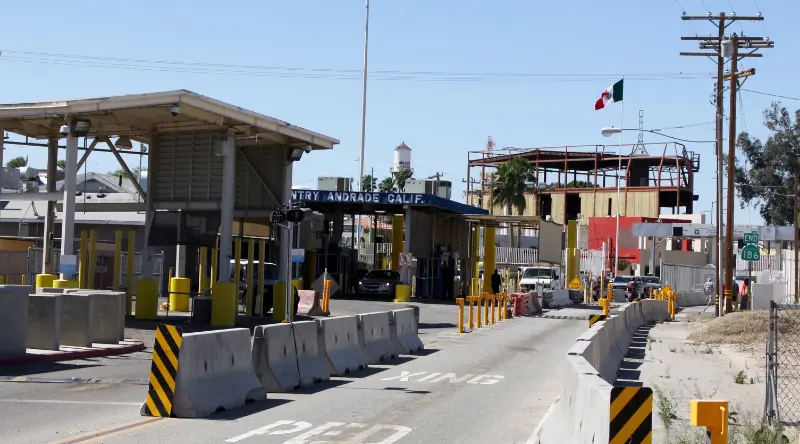A lot of you may have business plans, vacation plans, or maybe just a change of scenery and decide Mexico has some of those things you might want, it’s affordable and nearby, different culture, language, and pace, but you think to yourself. “Oh! I have a criminal record. Is it possible travel to Mexico with a felony record. Can a felon travel to Mexico?”
CAN A FELON TRAVEL TO MEXICO

It’s an understandable fear or worry, especially as you know how tight countries are regarding migration. They have stringent policies, especially when it concerns those with a checkered past or a criminal record. This is to avoid the spread of crime to their geographical borders, but this article is to answer all your questions, as well as guide you through the steps on how you can proceed with it, or stand the best chance of you getting through.
Mexico is a country that covers 1,972,550 square kilometers (761,610 Sq mi) with a population of about 126,014,024. Majority of which are Spanish speaking, a federal republic of 31 states. Though the weather ranges depending on the state and season, it majorly ranges from hot to very hot and then rainfalls, so you can consider it an escape from the cold of winter, a reason others may have for wanting a change of climate.
Also check out: Can a felon travel to the UK
Some other benefits to consider are:
-
Cost of Living
If you think the beautiful weather was reason enough to consider Mexico, there’s more. Mexico has a more affordable cost of living. The prices are relatively cheaper when compared to the United States, from the cost of a flight in the airlines to transportation, and all-around living. So, imagine a place considered a tourist destination, at a cheaper cost of living, renting an apartment could cost under $300 per month, depending on the area. This is advantageous especially when you consider the dollar to the pesos exchange rate, you can afford a fairly comfortable life.
-
Change of pace in lifestyle
You may not notice, but being in the city comes with a certain lifestyle you may have lived so long with that you do not notice. There is a rush in the pace of things, people moving at the speed of life as they run the rat race. The thought of bills to clear, status to attain, and lifestyle to sustain have you in a constant “go” mindset. Because of the different cultural lifestyles of the inhabitants of Mexico, the pace is different, after all, it is a tourist destination. Moving here can be infectious, the sights and society slowing you down, clearing your head, and helping you relax. It also helps that the cost of living is not as expensive and the exchange rate gives you the added benefit and edge to live more comfortably.
-
A fresh start
Moving to somewhere new is like an adventure, experiencing new things, places, cultures, and people. With that brings an opportunity people hope and pray for, a chance to be someone different. You are a new person in a new area surrounded by strangers; you know nothing about them and, most importantly, they know nothing about you; your history, struggles, or problems. With a fresh start, you get to be whoever you want to be.
-
Warm and Hospitable People
As expected, with places that are tourist attractions, the natives and people are friendly. Maybe it’s the knowledge that foreigners bring with them as a means to earn more for their country, or it’s just a policy, or nature of the people; which is understandable and logical as unfriendly people would not open their borders to strangers, no matter the money. Some are territorial like that.
In Mexico, the people are social and free, warm and friendly. They give credence to the old saying “make yourself at home” or in their language, which has become a very popular saying “Mi casa su Casa”. Hence, it is a bit expected that the Spanish-speaking nation should practice that type of open-arms hospitality. Then again, with great weather and scenery, it’s kind of hard to be moody and cloudy.
-
Experiencing another Culture

This will be an opportunity to be in a new place, see how they live, learn their language and enjoy the food you probably have never tasted, also a chance to be closer to nature. This change of scenery, activities, and cuisine adds a spice to life and an experience that sticks with you for a long time. It can go as far as changing your outlook on life as your experience and exposure help to shape your lifestyle and ideology.
Now the possible reasons for wanting to choose Mexico, if you have ever considered I have addressed it. Can a felon travel to Mexico? Let’s get to the guide on how you can go about getting there and the chances of getting there with a record.
After 9/11, border control regulations became more strict, as the U.S. and Mexico beefed up procedures and security measures to prevent future acts of international terrorism, which includes background checks. This information makes individuals with a criminal record concerned or worried about how their conviction could affect their ability to travel overseas.
This policy with Mexican Immigration Authorities ensures that dangerous and possibly violent individuals do not enter their country, but the Immigration officer assesses each case or individual you meet on duty. So, do not fret, there is still a high chance of a felon making it across their border.
If your record is a misdemeanor, you are certainly able to make the crossing into Mexico without much hassle or problems.
Conditions That Can Affect Your Travel/Migration status

If you require a visa, it is required that you disclose details of your criminal history when applying. For those who are eligible for visa-free access, please ensure to check your eligibility as well before traveling. Keep in mind that the final decision is going to be determined by the nature of the crimes and the circumstances involved.
Article 194 of the Federal Code on Criminal Proceedings states that serious crimes are those which have a significant negative effect on the fundamental values of society.
Registered sex offenders are treated the same as felons, and the migration officers determine if they get to enter Mexico, and in some cases, everything can rest upon the officer checking your request.
Below is a list of some of the records that are majorly flagged by the officers as a threat to the Mexican government.
- Counterfeiting of currency
- Assault on public communication channels
- Possession of arms reserved for the exclusive use of the Army, Navy, or Air Force
- Highway and road robbery
- Tax fraud
- Drugs and/or arms trafficking into the country
- Terrorism
- Child pornography
- Manslaughter
- Vehicular theft
- Trafficking of minors
- Drug-related crimes
- Exploitation of minors
- Prison escape
- Rape
- Human trafficking or trafficking of undocumented persons
- Extortion
Also, if you are currently facing felony charges and are awaiting trial when you apply, officials will immediately deny your entry.
If you have had your U.S. passport confiscated, then the probability of you being turned back at the border is extremely high. With Mexico being part of INTERPOL, there is access to the global database of felons, which means trying to be dishonest or lie will be a wasted effort and it is unlikely that the border control officers will overlook your felony charges.
Conclusion

Officially, or on record, the Migration officers are obliged by law to not allow individuals from other countries with ongoing felony charges, individuals without valid passports, and those convicted of serious offenses through. Off the record, though, it is not a guarantee. The final decision does rest (like I stated earlier) on the officer overseeing your request, no matter the means of transportation you choose to use. Though the means of entry does affect the likelihood of your success in entering Mexico with a felony record.
Airports have a record of having a higher security level in terms of checks before clearing passengers through. Your chances of getting let through if you choose this means of transportation are very slim, they will deny you most likely access. You stand a better chance of getting access to the country if you travel by road, especially if you have a U.S. passport.
With cruises, things tend to be different. There are two types of cruises: an open and a closed loop. The open loop happens when you leave from one port and arrive at a different one. To be able to go on this sort of cruise, you will have to engage with the same officers that would have to ask for and check your passport, the same as you would have to if you traveled by air or land.
Closed loop cruises are a little different. Here the cruise leaves and arrives at the same port, meaning a return trip. Though you may cross borders and enter a foreign country, you do not leave the ship but return to the place you started from. So, a passport would not be necessary in this case.
Hope this answers your question – can a felon travel to Mexico and show you the how to?